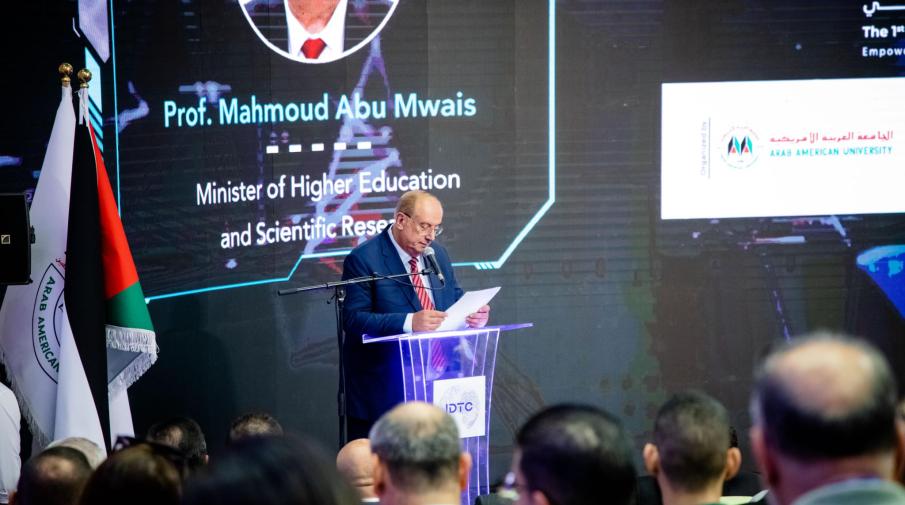His Excellency President Abu Mazen, the sponsor of the conference, may Allah protect him, and his representative Dr. Ziyad Abu Amr.
Honorable Dr. Yousef Asfour, and his deputy, Honorable Engineer Zuhair Hijjawi,
My brothers, distinguished ministers, members of the platform of honor,
Gentlemen, each as per their love for Palestine, and all of you are the beloved of Palestine.
Excuse me at the outset to congratulate Abu Osaid and Abu Tamer, Dr. Waleed, to all of you for the university and for Palestine, the first faculty of digital sciences in Palestine to be at the Arab American University. This great scientific edifice, which has become a fortress for modern science and a repository for productive scientific research, is Palestinian in methodology, is Jenin-based in production, and has international output.
Honorable audience, in higher education, there are three directions for digital education:
First: the use of artificial intelligence (AI) such as CHAT GPT and machine learning, and here these technologies are already being used to personalize learning experiences, adapt content to individual learning styles, and provide real-time feedback to both teachers and students. AI and machine learning can also help in automating administrative tasks and data analysis, which saves teachers valuable time to focus on teaching.
Second: the use of virtual reality (VR) and augmented reality (AR), as both can create wonderful learning environments that simulate real-life situations and scenarios, and this can be especially useful in fields such as medicine and engineering.
Third, Gamification and Navigation, as Gamification has gained great popularity in recent years, and involves applying game design principles to learning experiences, making them more attractive.
Ladies and Gentlemen,
Artificial intelligence is capable of improving people's lives and addressing the major challenges facing the society, but at the same time it is also capable of dramatically increasing risks to security and safety, violating civil rights and privacy, affecting human labor, and unequal opportunities, and this leads to increasing inequality.
The most important risk of artificial intelligence is that it becomes smarter than us, because our human brains can solve equations and drive cars thanks to the talent for storing information and devising solutions to problems, and we have nearly 86 billion neurons in our skulls and brains.
On the contrary, the technology behind the artificial intelligence program, for example (Chat GPT), is characterized by between 500 billion and trillion communication cells, which puts it in a very advanced place compared to humans. Therefore, artificial intelligence models know hundreds of times more than humans, and they are enormously able to learn quickly, which is known as the control problem.
Therefore, it is important to establish clear guidelines and regulations to ensure that AI systems are designed safely and their outputs are controlled to check for any signs of bias or abuse.
In conclusion, let me ask, is AI a goal or a means?
What is the difference between digitization and digital transformation?
Where are we from digital entrepreneurship and where to be our universities?
I hope this conference will come up with recommendations that answer these questions, and contribute to strengthening and developing the system of education, higher education and scientific research based on contemporary technology.
Long live Palestine,
Peace, mercy and blessings of Allah be upon you

